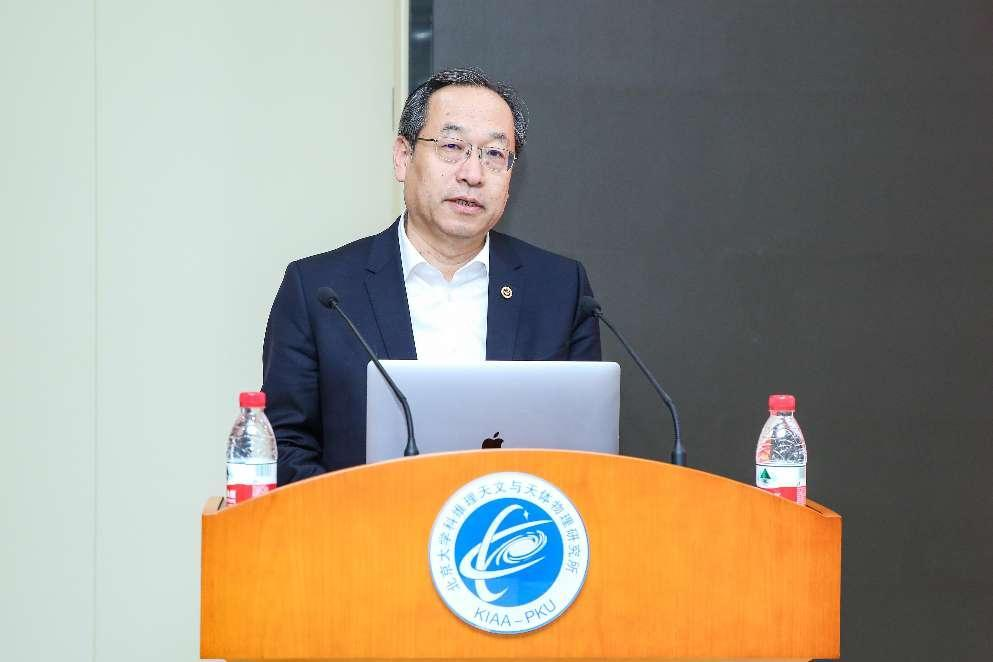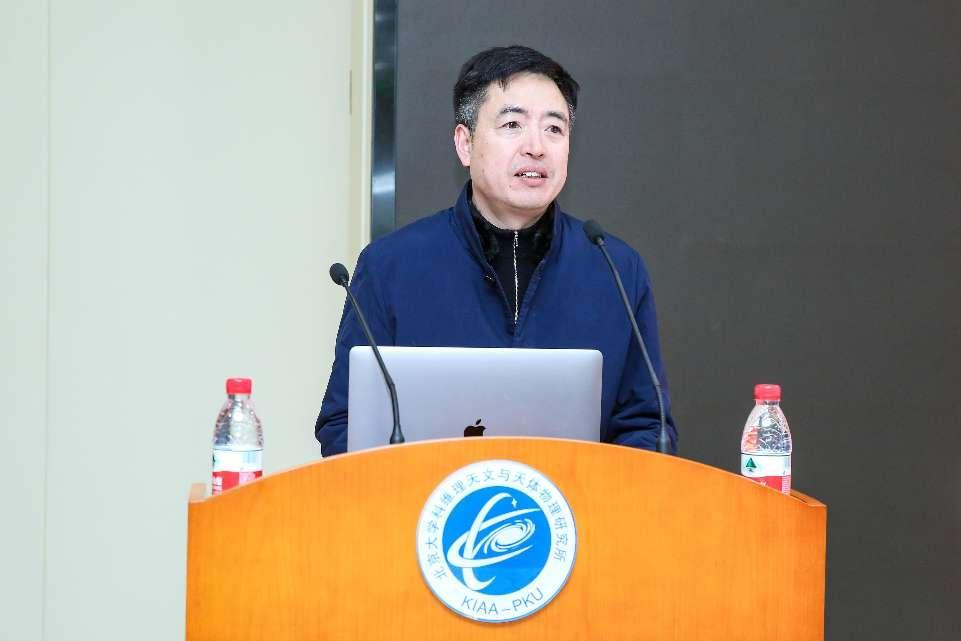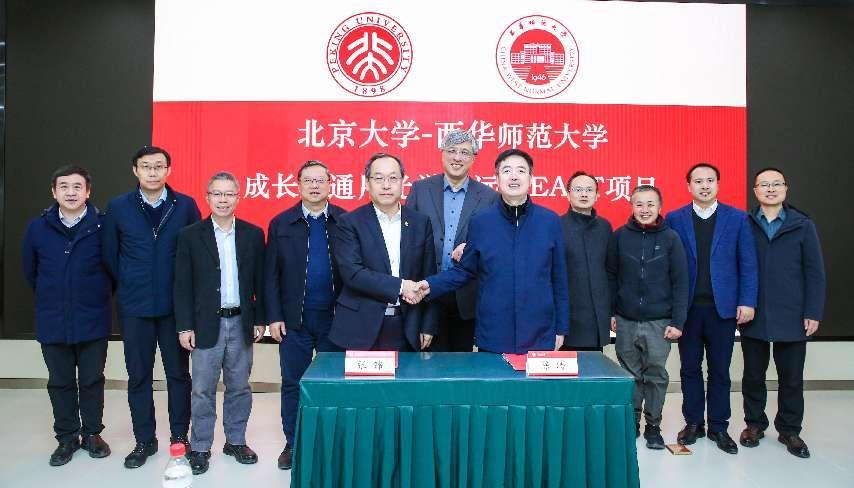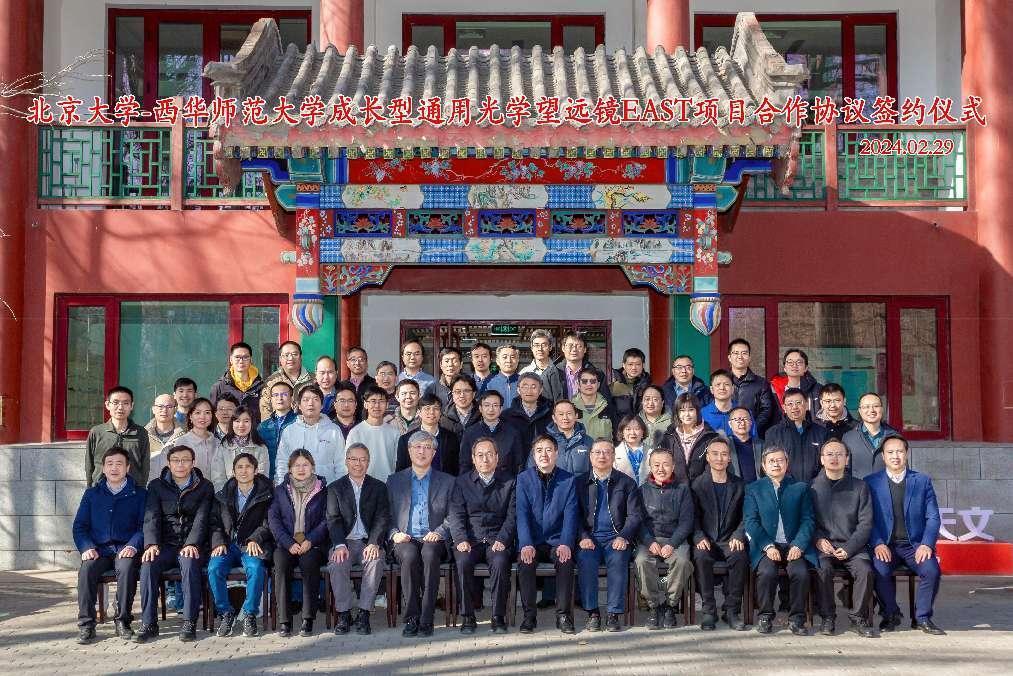On 29 February 2024, the Signing Ceremony of the Peking University (PKU)- China West Normal University (CWNU) Expandable Aperture Segmented Telescope (EAST) Project Collaboration Agreement and the Workshop on the Scientific Objectives of EAST were held at the Kavli Institute for Astronomy and Astrophysics (KIAA) at PKU. More than 50 leaders and experts from CWNU, PKU and other universities and institutes attended the meeting, including CHEN Tao, Deputy Party Secretary and President of CWNU, WANG Fangguo, Director of CWNU university Office, ZHENG Guo, Director of CWNU College-Local Government Cooperation Division, DENG Jing, Deputy Director of CWNU Publicity Department, JIANG Qingquan, Dean of CWNU School of Physics and Astronomy, DENG Licai, Chair of the CWNU Astronomy Department, ZHANG Jin, Vice-President of PKU and CAS Academician, GAO Yuanning, Dean of PKU Physics School and CAS Academician, Luis Ho, Director of KIAA and AAAS Academician, KANG Tao, Director of PKU Domestic Cooperation Office, ZHANG Cunqun, Associate Director of PKU Research Department, YANG Lingchun, Director of Basic Research Office of PKU Research Department, YAN Xueqing, Associate Dean of the PKU Physics School, SHEN Bing, Associate Dean of PKU School of Earth and Space Sciences, ZHAO Gang, Former Party Committee Secretary of NAOC and CAS Academician, ZHAO Gongbo, Deputy Director of NAOC, HU Zhongwen, Deputy Director of Nanjing Institute of Astronomical Optics & Technology, YUAN Feng, professor of Fudan University, WANG Xiaofeng, professor of Tsinghua University, ZHAO Wen, Executive Director of Astronomy Department of University of Science and Technology of China.
Luis Ho gave a brief introduction to the EAST project, which is a 6 to 8 meter expandable aperture segmented telescope to be constructed in Lenghu, Qinghai Province, where the conditions for astronomical observation are favorable. After the completion of this general-purpose optical telescope, which will be the largest in Asia, China's astronomical observation capability will be greatly improved. EAST will meet the urgent needs of astronomers for diverse optical astronomical observations to the greatest extent possible, as well as providing the much-needed conditions for the upcoming launch of CSST and the completed FAST to provide follow-up optical observations.

ZHANG Jin
ZHANG Jin expressed that PKU attaches great importance to basic research, and research equipment is crucial to the development of basic research. The construction of EAST plays a very positive role in promoting the development of astronomy. This is inseparable from the support and cooperation of the astronomy community, especially thanks to CWNU for its strong support to the project. Signing of this agreement has laid a solid foundation for the steady progress of the EAST project. He hopes PKU astronomy can seize this opportunity, maximize its advantages, deepen the cooperation and exchange with the astronomy community, and jointly promote the development of astronomy and basic research.

CHEN Tao
CHEN Tao briefly introduced the CWNU: “CWNU is a comprehensive university with a full range of disciplines, strong faculty, fruitful teaching and research achievements, and excellent social reputation. CWNU astronomy and PKU astronomy have maintained close contact and cooperation for a long time. CWNU took the lead in proposing to invest 15 million RMB in the EAST project this time, reflecting the determination of CWNU and PKU to work together to build advanced equipment for the country. It is expected that the two parties will work together to promote the development of astronomy in China.”

Signing Ceremony
ZHANG Jin and CHEN Tao signed the agreement, witnessed by GAO Yuanning, ZHAO Gang, Luis Ho, HU Zhongwen, KANG Tao, WANG Fangguo, ZHENG Guo, JIANG Qingquan and DENG Licai.
In order to explore the scientific research potential of EAST and discuss the design and construction of its associated instruments, a one-day workshop on the scientific objectives of EAST was held on the same day of the signing ceremony. More than 40 participating experts gave reports and joined the discussions. They put forward useful suggestions for the EAST project and discussed in-depth the use of EAST to achieve the first-rate fundamental research results in the future.

Group Photo
Introduction to EAST:
Peking University is leading the construction of the 6-8 meter diameter Expandable Aperture Segmented Telescope (EAST) to address the lack of large optical telescopes in China as soon as possible, to meet the major needs of national deep space exploration, and to provide the necessary conditions for the upcoming launch of China Space Station Survey Telescope (CSST), the already-operational FAST, as well as to enable follow-up optical observations of objects discovered using time-domain surveys. China West Normal University is the first partner to invest an in-kind contribution, 15 million RMB, to support the construction of EAST. With the approval of the leaders of both parties, Peking University and China West Normal University signed a formal agreement of cooperation for the development of the EAST.
For more information on EAST, please visit: https://astro.pku.edu.cn/research/PKU_EAST_ENG.htm